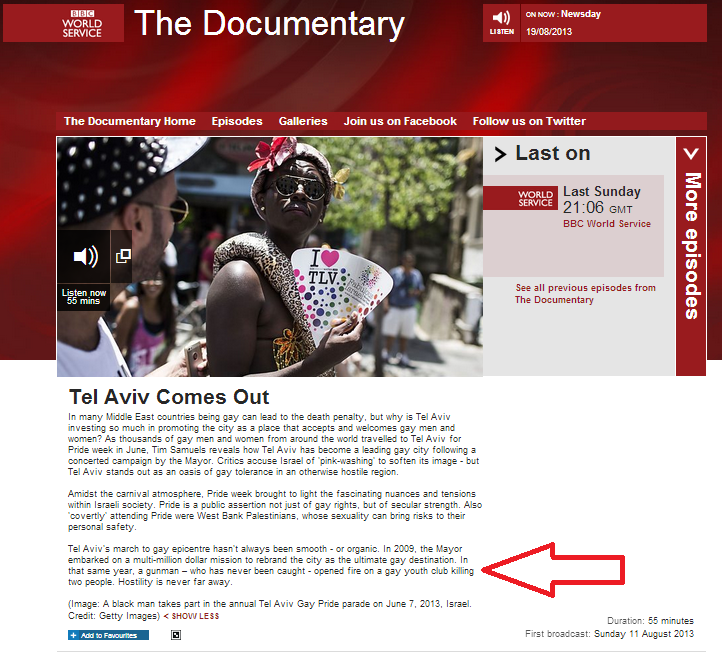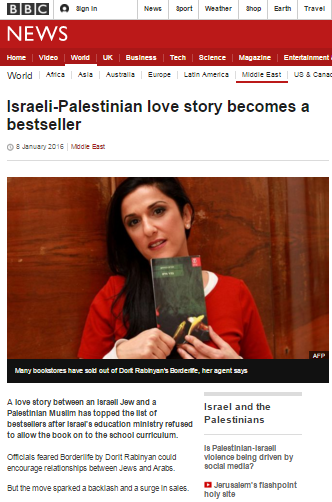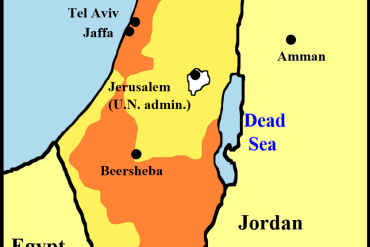Last week a message dropped into the BBC Watch mailbox promoting a BBC radio documentary. The e-mail came from the programme’s presenter – Tim Samuels – who also informed us that a television version of the documentary is scheduled for broadcast later in the year.
The radio version – titled “Tel Aviv Comes Out” – was broadcast on August 11th on the BBC World Service in the series “The Documentary“. Samuels recorded the programme in June 2013 and that fact seems to have contributed to issues regarding the accuracy of the synopsis which appears on the BBC website and in the documentary itself.
The synopsis states:
“Tel Aviv’s march to gay epicentre hasn’t always been smooth – or organic. In 2009, the Mayor embarked on a multi-million dollar mission to rebrand the city as the ultimate gay destination. In that same year, a gunman – who has never been caught – opened fire on a gay youth club killing two people. Hostility is never far away.”
The trouble with that statement is of course that a suspect in the Bar Noar shootings has been caught (in fact he was arrested during the time that Samuels was in Tel Aviv making the programme) and was charged with two counts of murder and attempted murder on July 8th 2013. The implication that the shootings were purely an anti-gay hate crime is also problematic given the information which emerged after the arrests.
That means that whoever wrote that synopsis has either not bothered to keep up with the facts of the case – and hence misleads audiences by making inaccurate statements – or that the facts of the case do not tailor themselves to the message he or she is trying to get across. Clearly, that synopsis needs to be corrected.
Tim Samuels’ programme itself is in parts very good, including interesting interviews with Professor Uzi Even, former MK Yael Dayan and others. Unfortunately, he – or his producers at Tonic Productions – also do not appear to have kept up with progress in the Bar Noar case – despite obviously being aware of the fact that arrests had been made. From around 31:35, Samuels can be heard saying:
“…Tel Aviv’s self-confident tolerance was suddenly shattered in 2009 right in the heart of the city… […] A gunman walked into the gay youth centre and opened fire, killing two and wounding fifteen. An unexpected and incongruous attack that brought about some serious national soul-searching. […] Today’s papers are reporting some extra news about the shooting in 2009 at the gay youth centre. They’re saying that finally – nearly four years later – arrests have been made in connection to the shooting…”
It should be pretty standard practice for a documentary maker involved in a project which includes reporting on a criminal investigation to keep up with developments in that investigation and update and amend the programme accordingly – rather than going ahead with the broadcast of inaccurate and misleading information which is two months out of date. That should clearly apply even more so when the programme is to be broadcast by the BBC, which purports to demand the same editorial standards of accuracy and impartiality from commissioned work as it does in its own content. 
The other problem with this documentary is its mainstreaming of the language of delegitimisation of Israel through its focus on – and promotion of – accusations of alleged “pinkwashing”. Samuels opens his documentary by asking:
“But has the city’s [Tel Aviv] gay and lesbian cause been co-opted and used as a public relations tool by Israel?”
At 19:45 he says:
“What concerns some is that all this talk of tolerance – and the mayor’s money – is being used to deflect attention from the Palestinians and that gay rights have become a Public Relations tool.”
The trouble is that Samuels does not bother to properly inform his listeners who those “some” are and what their fringe agenda is. Audiences then hear an unidentified woman telling Samuels that “when tourists come here they see all this pinkwashing” and claiming that Israel is to blame for the fact that Palestinians cannot lead openly LGBT lives. Samuels then interviews Eyal (sometimes spelt Aeyal) Gross, whom he introduces merely as “associate professor of law at Tel Aviv university” – failing to inform audiences that Gross is a seasoned activist not only on the LGBT scene, but has also sat on the boards of ‘ACRI‘ and ‘Gisha‘.
Whilst the opposite point of view to the two interviewees promoting the notion of “pinkwashing” is put by Tel Aviv council member and mayoral advisor on LGBT rights Yaniv Weizman, Samuels fails to adequately inform his audiences that the “pinkwashing” claim is just one tactic used within the wider context of political activism aimed at the delegitimisation of Israel. As we have noted here many times before, the BBC’s editorial guidelines on impartiality clearly state that:
“We should not automatically assume that contributors from other organisations (such as academics, journalists, researchers and representatives of charities) are unbiased and we may need to make it clear to the audience when contributors are associated with a particular viewpoint, if it is not apparent from their contribution or from the context in which their contribution is made.”
The failure to make Gross’ political associations clear and the resulting lack of context to his politically motivated comments clearly breach that guideline.
Let’s hope that these issues are dealt with before the television version of this documentary is broadcast so that what otherwise could be an interesting programme is not marred by failures of accuracy and impartiality.





